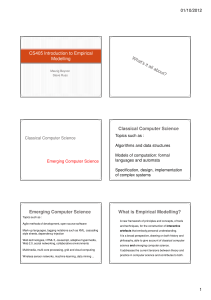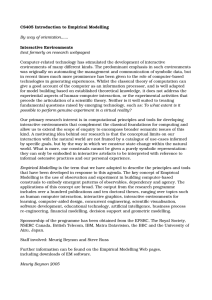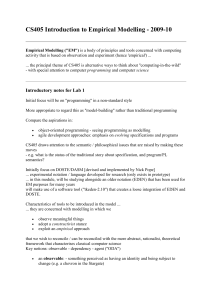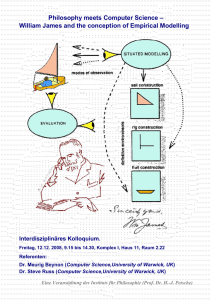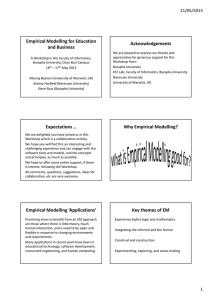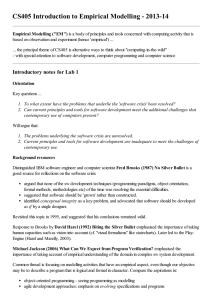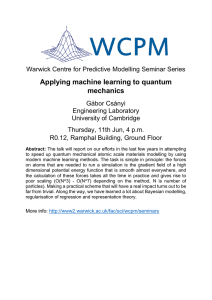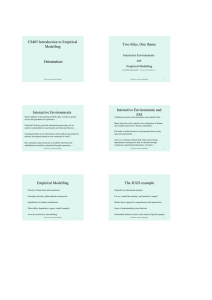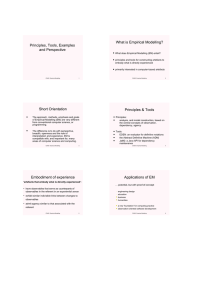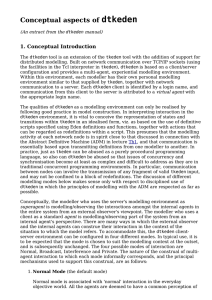CS405 Empirical Modelling An Introduction to
advertisement
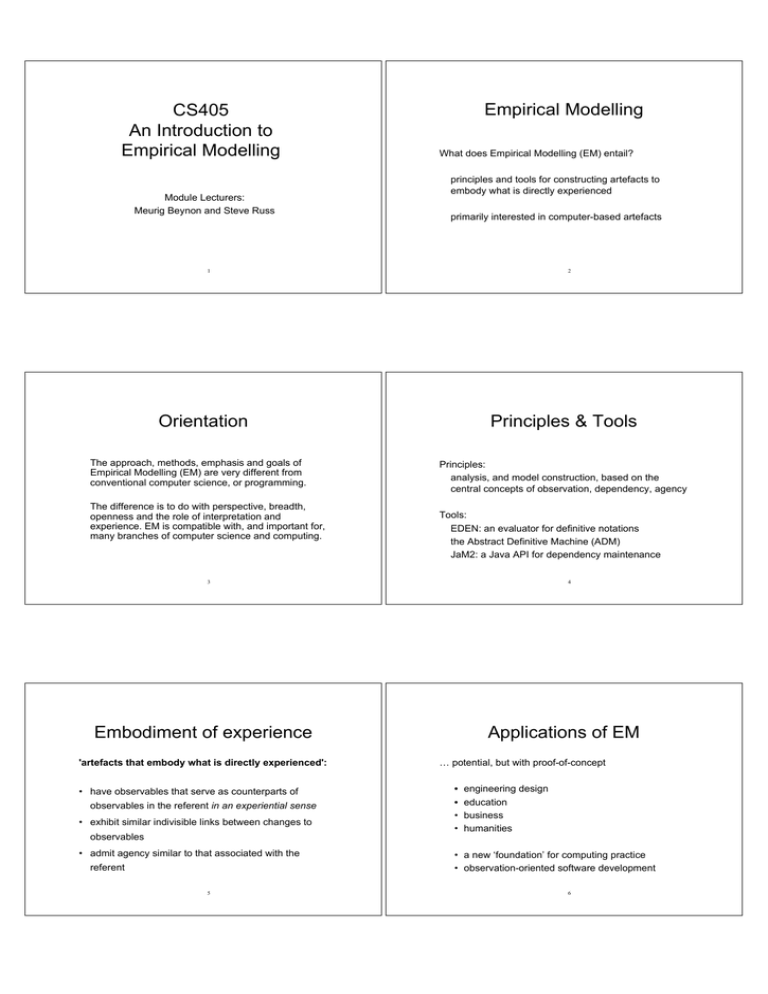
CS405 An Introduction to Empirical Modelling Module Lecturers: Meurig Beynon and Steve Russ Empirical Modelling What does Empirical Modelling (EM) entail? principles and tools for constructing artefacts to embody what is directly experienced primarily interested in computer-based artefacts 1 2 Orientation The approach, methods, emphasis and goals of Empirical Modelling (EM) are very different from conventional computer science, or programming. The difference is to do with perspective, breadth, openness and the role of interpretation and experience. EM is compatible with, and important for, many branches of computer science and computing. Principles & Tools Principles: analysis, and model construction, based on the central concepts of observation, dependency, agency Tools: EDEN: an evaluator for definitive notations the Abstract Definitive Machine (ADM) JaM2: a Java API for dependency maintenance 3 4 Embodiment of experience 'artefacts that embody what is directly experienced': • have observables that serve as counterparts of observables in the referent in an experiential sense • exhibit similar indivisible links between changes to observables • admit agency similar to that associated with the referent 5 Applications of EM … potential, but with proof-of-concept • • • • engineering design education business humanities • a new ‘foundation’ for computing practice • observation-oriented software development 6 Plan for the module Support for the module Part 1: a practical introduction to EM based on EDEN Major support for the work of the module this year is coming from four PhD students who are acting as tutors: Principal focus: exposition and review of EM Based on Concurrent Systems Modelling module Russell Boyatt, Eric Chan, Part 2: a more detailed study of principles, concepts and application areas ( + a little philosophy). Charles Care, Antony Harfield Sometimes helping in lectures, usually helping on practical sessions on Fridays - make use of their help! Will include more reflection on ideas of EM in relation to conventional areas of CS 7 8 A reflective exercise Is Computer Science really a science? Goal is to decide ‘yes’, ‘no’, or ‘don’t know’ + reasons. Consider individually (or pairs) [5 mins] Pool resources in groups with tutor [5mins] Plenary session to assess any common themes or common problems [5mins] Notes: Is CS a science? What makes a science? Experiments, theories, predictions, connections with other sciences? Consider physics, astronomy, geology, biology. Natural philosophy, natural science, experimental science. Science as body of knowledge (18C). CS as science using computers as tools or instruments, or science of the behaviour of computers themselves? Does the universe, or nature, compute? Can CS be a natural science? Are any modules in CS degree like science? Are maths/logic sciences? Why? Or Why not? Is there a science of programming? Is chip design and manufacture a science? If CS is a science, what is it a science of? if not, what is it? 9 10 Resources 2 Resources 1 The CS405 on-line materials page The EM webpage: http://www.dcs.warwick.ac.uk/modelling • • • • • • extensive discussion about the nature of EM complete lists of publications for EM details of postgraduate theses from the EM group archive / screenshots of EM models information and documentation for tools instructions for downloading versions of tkeden 11 http://www2.warwick.ac.uk/fac/sci/dcs/research/em/teaching/cs405/ - will contain handouts from lectures and labs also various other useful materials and links The EM archive, linked from the EM webpage: http://empublic.dcs.warwick.ac.uk/projects See directory /dcs/emp/empublic/projects - a web repository largely consisting of EM models most of the models are recent, and can be downloaded 12 Resources 3 EM publications – index accessible via EM webpage See directory /dcs/emp/empublic/publications - an electronic library of EM publications: papers and talks MSc92-9 – accessible via Teaching link from EM webpage - a web-based compendium of the resource material for "Empirical Modelling for Concurrent Systems", a one week taught module delivered as part of a one year MSc programme run by the department from 1992-9. 13 Summary of main ideas EM is primarily concerned with specific and concrete situations (cf. the emphasis on abstraction in classical modelling) EM research contributors Postgraduate research personnel 1984-2005 Meurig Beynon, Steve Russ Russell Boyatt, Antony Harfield, Charles Care, Eric Chan, Karl King Ashley Ward, Chris Roe Edward Yung, Mike Slade, John Buckle, Samia Meziani, Simon Yung Alan Cartwright, Paul Ness, Dom Gehring, Patrick Sun, Richard Cartwright Y-C Chen, Suwanna Rasmequan, Soha Maad, Jaratsri Rungrattanaubol Tim Heron, Ruyuan Wang, Allan Wong, J-P Dupont, K-C Tan 14 Things to do 1. Look at the main jugs.e file in the jugs models, see how it works, and experiment with those models. EM aims at creating artefacts that capture state-as-experienced The complexity and subtlety of state-as-experienced is awesome, and cannot be circumscribed The flexibility of human interaction in the world contrasts with the rigidity of the relationship between a typical computer system and its environment 15 2. Consult the /dcs/emp/empublic/publications directory for characterisations and illustrative examples of observables, dependencies and agents. 3. Reflect on how the concepts of agency, observation and dependency relate to some part of life with which you have a lot of experience. 16
